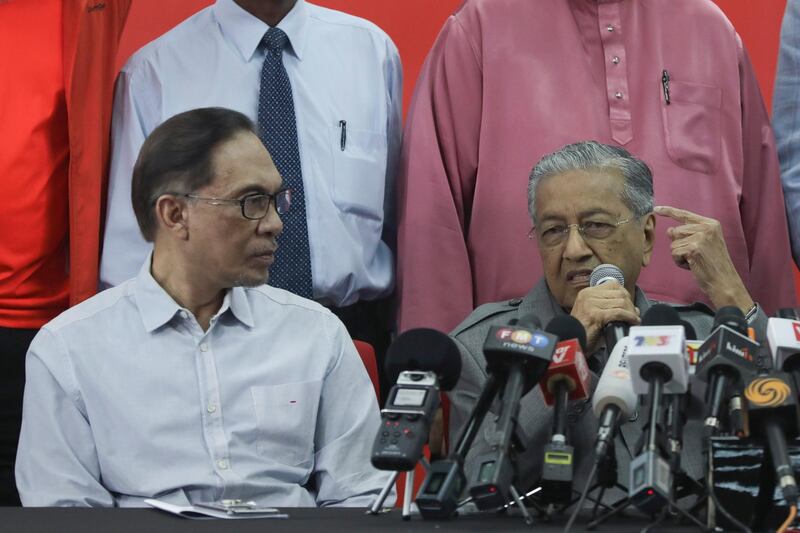If a week is a long time in politics – as the former UK prime minister Harold Wilson once observed – then Malaysia has just demonstrated how much can happen in only three days.
The reformist government that was elected two years ago has collapsed. An alternative ethnic Malay-dominated coalition that would have dented Malaysia’s reputation as a multicultural, multi-faith country has been proposed instead. Moreover, the prospect of Malaysia evolving into an issues-based democracy, instead of one dominated by personalities and intrigue has suffered a devastating setback.
From May 2018 until his shock resignation on Monday, Malaysia was ruled under a coalition government by Dr Mahathir Mohamad, who also served as prime minister from 1981 to 2003. Dr Mahathir’s most recent tenure in office was initially meant to be a caretaker government while his protege and designated successor, Anwar Ibrahim, awaited release from prison a royal pardon for a sodomy conviction.
The relationship between Dr Mahathir and Mr Anwar, however, has long been fraught and complicated, and many believe that the former is resisting attempts to hand power to the latter.
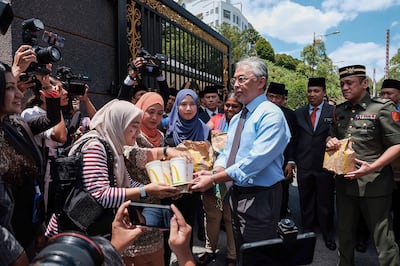
Last Friday, the presidential council of Dr Mahathir’s Pakatan Harapan (PH) party met to discuss a plan for the prime minister to step down and make way for Mr Anwar, who leads the People’s Justice Party (PKR), to finally take office.
By the end of Monday, however, PH's coalition government had fallen apart. One party left and another splintered – hoping to form a new government by allying with the main opposition parties. Dr Mahathir had been assumed to be behind the move, not least because the party that left – Bersatu – was set up as his own vehicle to return to politics. But he refuted the claims, handed in his resignation to Malaysia's king in protest and left his own party for good measure.
As the dust is settling, two things are clear.
Whereas previously, many were pressuring 94-year-old Dr Mahathir to set a date for his departure quickly, suddenly it appears that every MP from every party wants him to remain prime minister, and mostly for as long as he wants.
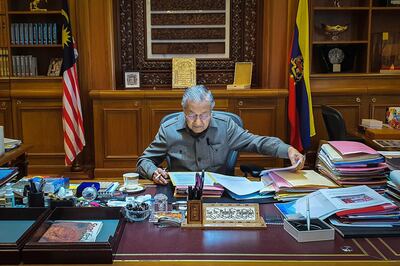
Moreover, Mr Anwar’s chances of succeeding him are looking slimmer than ever.
Many will see the current political turmoil solely through the Mahathir-Anwar lens. The pair's relationship goes back to 1982, when Dr Mahathir was a newly-minted prime minister and brought Mr Anwar, then a firebrand youth leader, into the government he headed at the time, under the Barisan Nasional (BN) party.
Mr Anwar advanced swiftly through the ranks, becoming a minister the following year, finance minister in 1991 and deputy prime minister in 1993. Five years later, though, he was sacked from all his posts and later convicted of sodomy and corruption.
Mr Anwar’s supporters claimed the charges were inflated, and the sodomy conviction was later reversed. Partisans of Dr Mahathir have claimed that Mr Anwar, although by that time already designated the former’s successor, was impatient and was trying to force his mentor from office. They point out further that he was convicted in the first instance and therefore guilty as charged.
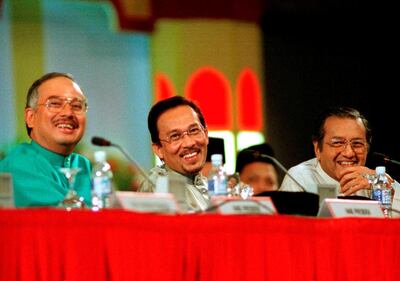
In the two decades afterwards, Mr Anwar led a new movement for reform and came close to defeating the long-ruling BN coalition in 2013. Dr Mahathir officially retired in 2002, but handpicked the next two prime ministers – Abdullah Ahmad Badawi and Najib Razak – before becoming dissatisfied with them and using his influence to force them out of office.
Mr Najib’s premiership ended in May 2018, when the PH-led opposition – with, in a dramatic turn of events, Dr Mahathir at the helm – turfed BN out of office for the first time ever in a general election. This was not in the least due to the fact that Mr Anwar (who was back in prison for a second time) agreed to set the past aside, re-join Dr Mahathir’s ranks and assist his efforts against Mr Najib.
This was when Dr Mahathir's caretaker government began, as per his agreement with Mr Anwar. Dr Mahathir was meant to cede power after six months, pending Mr Anwar's receipt of a royal pardon and release from prison. Mr Anwar was cleared and freed shortly after the election, but nearly two years on, the handover of government never occurred.
Mr Anwar, meanwhile, has kept smiling while telling everyone not to fuss about the succession plan. But many suspect that the rapprochement between him and the prime minister is not real, and that their deal will go unfulfilled. Instead, Dr Mahathir might favour Azmin Ali, Mr Anwar's deputy in PKR.
And so to this weekend, when leaders of several factions went to the royal palace to tell the king that together they represent a majority in parliament and should be allowed to form a new government with Dr Mahathir at the helm.
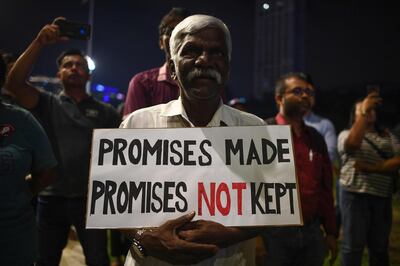
The group represents almost entirely ethnically Malay and some Islamist-leaning political bodies, and would have a good chance of securing the more than 50 per cent Malay-Muslim vote. For BN politicians currently facing graft charges, there would be hope that the cases would be quietly dropped.
But all of this, according to Mr Anwar, has been done falsely in the current prime minister’s name. Dr Mahathir would not work with what he regards as the corrupt BN, Mr Anwar claims. The fact that he resigned – he is acting prime minister at the moment – and left his own party gives credence to the idea that overeager subordinates have gotten ahead of themselves.
On the other hand, Dr Mahathir has switched sides before in order to maintain his influence and top position.
With the departure of the mutineers, PH has lost its majority. Mr Anwar and Lim Guan Eng, the leader of the mainly Chinese DAP – which is also part of the crumbling PH-led alliance – have pleaded with Dr Mahathir to save the coalition. The opposition’s plan, they claim, is to woo him onto their side and to sideline non-Malays and non-Muslims from government.
Just what will happen in the coming days, when a new government must be formed, is unclear. But so far there is only one beneficiary: Dr Mahathir, who will have his pick of parties and politicians, with a new, devoted administration that will not require any promises about handovers.
The details of the plotting and “betrayals”, as Mr Anwar calls them, will also emerge. But for now, the doctor has consolidated his grip as Malaysia’s leading political force.
Sholto Byrnes is a commentator and consultant in Kuala Lumpur and a corresponding fellow of the Erasmus Forum
